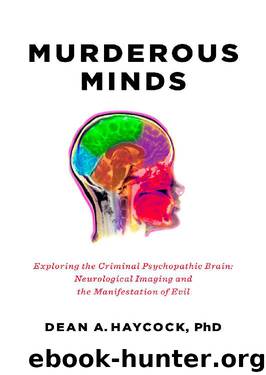Murderous Minds: Exploring the Criminal Psychopathic Brain: Neurological Imaging and the Manifestation of Evil by Dean A. Haycock

Author:Dean A. Haycock
Language: eng
Format: mobi
Tags: true crime, psychology
ISBN: 9781480448001
Publisher: Pegasus Books
Published: 2014-03-04T05:00:00+00:00
Chapter Seven
Missing Fear and Empathy
THE HAUKELAND UNIVERSITY HOSPITAL in Bergen, Norway covers a lot of land. The trees lining the streets of Bergen can’t hide its buildings, which cover over two million square feet of space. The single main building alone covers more than 11/3 million square feet. The Hospital employs around 11,000 people who treat or assist in the treatment of nearly 600,000 patients per year. If you find yourself in Norway and incur severe burns, develop a brain tumor, or experience decompression sickness or the bends while scuba diving in a fjord, this is where you should ask to be taken for the best specialist care. The Hospital also has a Center for Research and Education in Forensic Psychiatry and a Regional Security Unit. If you are a criminal psychopath and volunteer for a brain scan, you might have it done at Haukeland.
This is where LTK, a 25-year-old Norwegian man who impressed researchers as “somewhat grandiose” as well as manipulative, conning, and superficially charming in his social interactions, had his brain scanned. Like most individuals described in medical case reports, LTK is known to readers only by his initials.
It would be nice for his fellow Norwegians if LTK’s psychopathic profile were limited to the classic traits of manipulative conning behavior, superficial charm, and the grandiose sense of self-worth his doctors saw in him. Sadly, his score of 36.8 out of 40 on the Hare Psychopathy Checklist (PCL–R) reflects some far more troubling traits—and convictions. The worst was for rape. Helge Hoff, who works at Haukeland University Hospital’s Center for Research and Education in Forensic Psychiatry, and his colleagues described LTK, who agreed to have his brain scanned while processing emotional information as part of an experiment, as a “prototypical criminal psychopath.”1
We know that a key way in which LTK and other criminal psychopaths differ from non-psychopaths is the way their brains deal with emotions. They don’t respond to emotional images or situations in the same way people who lack psychopathic features do. For the most part, they have impaired ability to process or personally relate to the emotional content of words or emotional experiences.
For example, consider the following scenarios or situations. You are waiting to be called into a dentist’s office for a procedure you fear. You discover that a creepy insect is under the bedcovers with you. You see a companion run down by an automobile. You hear sounds of a break-in when you are in the shower.
If your brain processes emotions like most people, seriously considering all of these scenarios is liable to produce some subtle but predictable and measurable effects. This ability to re-create or feel someone else’s discomfort is not “just in your head.” Your body responds as well. Your heart beats a little bit faster and you sweat more as you become more emotional. Even a small increase in moisture can be detected, because it makes it easier for an electric current to pass between sensors placed on your skin. Scientists measuring this
Download
This site does not store any files on its server. We only index and link to content provided by other sites. Please contact the content providers to delete copyright contents if any and email us, we'll remove relevant links or contents immediately.
| Administration & Medicine Economics | Allied Health Professions |
| Basic Sciences | Dentistry |
| History | Medical Informatics |
| Medicine | Nursing |
| Pharmacology | Psychology |
| Research | Veterinary Medicine |
The Art of Thinking Clearly by Rolf Dobelli(10458)
The 5 Love Languages: The Secret to Love That Lasts by Gary Chapman(9792)
Mindhunter: Inside the FBI's Elite Serial Crime Unit by John E. Douglas & Mark Olshaker(9325)
Becoming Supernatural by Dr. Joe Dispenza(8204)
Nudge - Improving Decisions about Health, Wealth, and Happiness by Thaler Sunstein(7694)
The Road Less Traveled by M. Scott Peck(7594)
Mastermind: How to Think Like Sherlock Holmes by Maria Konnikova(7325)
Enlightenment Now: The Case for Reason, Science, Humanism, and Progress by Steven Pinker(7307)
Win Bigly by Scott Adams(7184)
The Way of Zen by Alan W. Watts(6604)
Factfulness: Ten Reasons We're Wrong About the World – and Why Things Are Better Than You Think by Hans Rosling(4737)
The State of Affairs by Esther Perel(4712)
Gerald's Game by Stephen King(4642)
Man's Search for Meaning by Viktor Frankl(4586)
The Confidence Code by Katty Kay(4252)
Thinking in Bets by Annie Duke(4218)
The Healing Self by Deepak Chopra(3568)
Hidden Persuasion: 33 psychological influence techniques in advertising by Marc Andrews & Matthijs van Leeuwen & Rick van Baaren(3560)
The Worm at the Core by Sheldon Solomon(3486)
